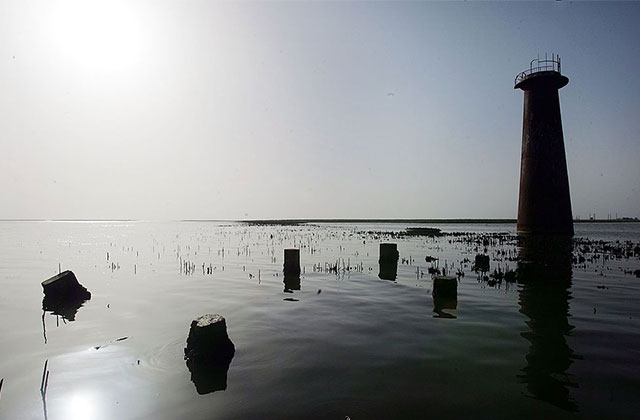Southern Louisiana is losing more than 10,000 acres of wetlands every year. And climate change is to blame.
The region is home to about 120,000 people—and they need to decide what’s the next best step for their wellbeing, as a Thomson Reuters Foundation feature published today (July 5) highlights. While many parts of the country are dealing with similar issues of sea level rise and land loss, it has been relentless in this area. Per Thomson Reuters:
Many low-lying coastal regions in the United States face erosion and rising sea level, linked to climate change, but the Mississippi delta is particularly vulnerable because it is sinking as well.
It is subsiding an average of 9 millimeters (0.35 inches) a year, 50 percent faster than had been thought two years ago, according to Tulane University geologists, who described the coast of Louisiana as one of the "most vulnerable" in the world.
“We are in a race against time in Louisiana,” Gov. John Bel Edwards said in March, announcing [Louisiana’s Strategic Adaptations for Future Environments] – which he said could become a national model for threatened communities.
In the state, some communities are most vulnerable to these impacts. Coastal Native American tribes, such as the Isle de Jean Charles band of Biloxi-Chitimacha-Choctaw Indians, are already feeling the impacts. This demographic has been deemed the first American climate refugees. The federal government has allocated more than $48 million toward relocating the tribe, which it hopes to accomplish by 2022.
Plaquemines parish, which sits on the state’s southeastern tip, is also figuring out how to best handle climate change. It received $45 million from BP in May due to the 2010 Deepwater Horizon oil spill, the largest oil spill in the country’s history. The parish needs to figure out how to spend the money, though some experts told Colorlines that they hope it goes back into rebuilding the economy so that community members can get back on their feet.
The parish has a concentration of Black, coastal Native and Asian immigration communities, who have been reeling from the disaster’s impacts to the local fishing industry and economy. Climate change is only worsening their situation.
Still, as the Thomson Reuters story makes clear, some locals remain skeptical about how the global catastrophe is impacting them—and, perhaps more so, how the government is responding to the catastrophe. The story states:
While plenty of people in southern Louisiana may experience disappearing land and rising water, they may not believe the government has their best interests at heart, said John Doucet, a geneticist at Nicholls State University in Thibodaux, Louisiana, and a faculty member at its Center for Bayou Studies.
One reason, he said, is that they have not been protected from the skyrocketing costs of buying flood insurance—something banks require before making home loans.
“There’s a large anxiety about trusting government to make good choices for the people,” he said.
Read the full story here to learn more about the region and climate change’s disproportionate impacts on its residents.
